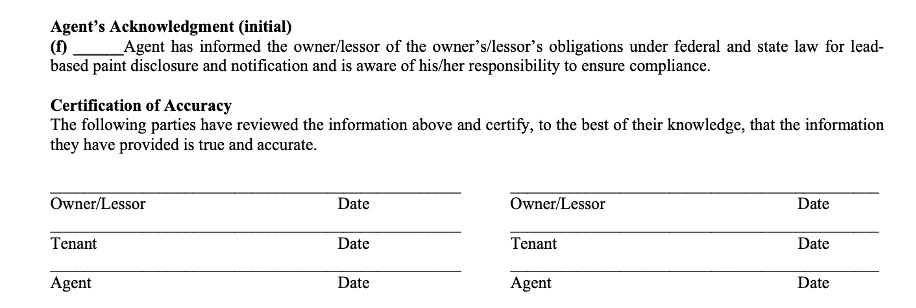Northeast Association of REALTORS®
Legal Insights: Lead Paint Forms, 'SOLD' Ads by Buyer’s Agents & 21E Inspections
5/6/2025
Is the tenant’s agent required to sign the Tenant Lead Paint Certification?
Under state and federal law, owners and their agents must comply with tenant lead notification requirements for properties built before 1978 prior to a prospective tenant entering into a lease agreement.
The owner is obligated to sign two copies of the Tenant Notification and Tenant Certification Form, keeping one fully executed copy for their records and providing the other to the prospective tenant. A copy of the most recent inspection report and/or letter of compliance or interim control for the unit, if one exists, must also accompany the Form. Owners who fail to comply with this requirement are subject to civil penalty under Massachusetts law and both civil and criminal penalties under federal law.
The purpose of the Tenant Lead Law Notification is twofold: to provide tenants with information and resources about lead paint, the danger of lead poisoning, and tenant rights, as well as informing them of the status of the property as to the owner/lessor’s knowledge. Importantly, in Massachusetts, the owner is obligated to have the home inspected for lead if it is built prior to 1978 and a child under the age of six lives there. If lead hazards are found, the home must be deleaded or brought under interim control.
The Tenant Certification Form that accompanies the Tenant Lead Law Notification memorializes the owner’s disclosure, the tenant’s receipt of any listed documents and Notification, as well as the agent’s acknowledgment that they informed the owner/lessor of their obligations under federal and state law including disclosure, notification, and their responsibility to ensure compliance.
Following the owner’s disclosure, the tenant’s initials confirming receipt and the agent’s acknowledgment, the Form provides for a signature from the owner, tenant and agent as to the accuracy of the information they have initialed. While there is a space indicated for a second agent, the tenant’s agent does not play a role in providing any of the information included on the Form and therefore they do not have the ability to certify “the information they have provided is true and accurate.”

At the same time, if the agent for the tenant does sign it, there is not necessarily any harm in that. Tangentially, it is important to note that the law does not specifically delineate between owner’s agent and tenant’s agent and if you are the only agent, you should inform the owner/lessor of their obligations and facilitate the Notification and Certification paperwork.
Can a buyer’s agent advertise a property their client purchased as “SOLD”?
The Code of Ethics, Article 12, Standard of Practice 12-7 provides that a REALTORâ who participated in the transaction as the listing broker or selling broker may claim to have “sold” the property. At the same time, a real estate professional and REALTORâ member must present a true picture in their advertising, marketing, and other representations meaning they cannot suggest that they were the ones who listed the property.
When developing a marketing tool using properties that you helped to sell by procuring a buyer for a successful purchase ensure that you accurately represent your brokerage’s role while also respecting any photographer’s rights in the photos used as well!
As a reminder, under the Board of Registration of Real Estate Brokers and Salesmen Professional Standards of Practice found in 254 CMR 3.00, the advertisement must also include the name of the broker.
Are 21E environmental inspections required as a part of a commercial sale?
The law does not mandate that a hazardous waste site assessment or environmental testing be performed when a property is transferred. However, a buyer may request it, and a lender will likely require it to some degree. This is because the law provides for joint and several liability in the clean-up of any hazardous materials, including oil.
Massachusetts General Laws Ch. 21E does state that if a release of hazardous materials is detected on a property, all past and present owners/operators could potentially be liable for that release by the Commonwealth. For this reason, buyers and sellers often choose to perform the 21E site assessments on certain properties in a commercial sale to verify the environmental conditions at the site at the time of purchase thus limiting and/or negating the liability in either direction (seller/buyer).
Environmental assessments for hazardous materials or underground fuel contamination can extend to residential properties where an underground oil tank exists or was recently removed for example. As a real estate professional, familiarize yourself with the characteristics and previous uses of the properties that you assist your clients in buying or selling and advise them of their rights to conduct inspections, including those for hazardous materials.
To learn more about the Massachusetts Oil and Hazardous Material Release Prevention and Response Act, please see: https://malegislature.gov/Laws/GeneralLaws/PartI/TitleII/Chapter21E
****************************************************************************
Services provided through the Massachusetts Association of REALTORS® is intended for informational purposes and does not constitute legal advice, nor does it establish an attorney-client relationship. The Massachusetts Association of REALTORS®, by providing this service, assumes no actual or implied responsibility for any improper use of responses to questions through this service. The Massachusetts Association of REALTORS® will not be legally responsible for any potential misrepresentations or errors made by providing this service. For more information regarding these topics authorized callers should contact the MAR legal hotline at 800-370-5342 or e-mail at legal@marealtor.com.
Powered By GrowthZone
